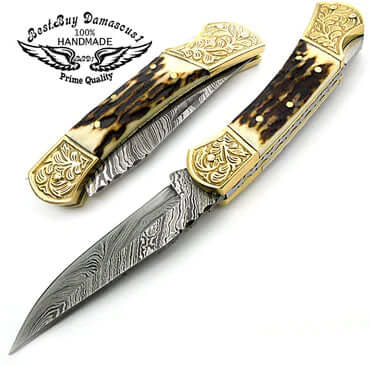
Custom-Made Damascus Steel Knives
Posted by Best.Buy. Damascus1 on
Many people think that Damascus steel knives are the best knives. They are also considered to be excellent collectors' knives because of their historical value and legendary reliability. Its wavy protrusions, designed in different patterns, allow you to rely on the knife to be effective no matter what the job.
Features Of Damascus Steel Knives:
Damascus steel knives made to order do not need to be sharpened as often as other knives. The wavy pattern of Damascus steel actually protects your knife, making it last longer than regular steel. This unique steel is prized for its beautiful aesthetics, but what it lacks in durability it makes up for by being extremely hard and flexible while maintaining a sharp blade.
Forged from a single piece of high-carbon steel, this knife is hand polished on both sides and the ornate patterns are created by hammering the steel pieces together. This stunning pattern is what makes these knives stand out!
How are Damascus knives made?
The finest bespoke handmade Damascus steel knives are made from hundreds of layers of metal that are welded together, then forged, beaten, and machined to form a unique pattern. They are then folded and flattened to create the organic pattern that characterizes them. Today, this ancient process is commonly referred to as 'pattern welding', but old-school Damascus knives are still made mainly by welding together different types of steel before pounding, twisting, and manipulating the metal, or by flattening and then bending one type of steel to form layers of metal.
How to care for a Damascus steel knife:
Custom handmade Damascus steel knives are known for their dramatic beauty and durability. No one likes to invest all that time in a knife only to have it end up as a part of your kitchen. That's why a knife like this needs special care so that you can use it every day, not just when you're cooking.
Careful selection, care, and maintenance will help you to prolong the life of your Damascus steel knives. It is important to keep your knives dry and clean to avoid rust and stains. A rough cloth or metal cleaner can be used to remove the etched oxidation that makes the blade pattern visible.
Types of Damascus knives:
Here are some of the best Damascus steel knives, with many different styles to choose from and several benefits you can gain from using them in your kitchen.
Chef's knife: This blade gives the knife incredible strength, flexibility, and hardness.
The utility knife: A knife for all trades. This is a high-performance solution for all kitchen tasks.
Meat knife: The sharp blade of this knife is handmade and is perfect for slicing, carving, and serving any type of meat.
Scissors knife: A useful tool for excellent chopping efficiency, this knife is a cook's and butcher's best friend.
What You Need to Know About Damascus Steel
If you've never heard of Damascus steel before, you've probably never actively sought out collectors' knives
A Legendary Material That Is Now Lost to Time
Any enthusiast would admit that Damascus steel is almost like something out of mythology. That's because it was a particularly durable steel alloy forged from various types of metals in Syria and the surrounding area from around 750 to 1750 BC. Its distinguishing feature was its strength, sharpness, and the water pattern on the blade, which was created when the metals came into contact at high temperatures.
What makes Damascus knives so special?
Beyond the manufacturing process and the unique combination of steel, the simple reason to choose products made from Damascus steel is that they are durable, strong, reliable, long-lasting, and very attractive. These knives also usually have specialized handles that provide a comfortable and quick grip, making them ideal for almost any purpose.
Aesthetic Value
As mentioned above, these knives are beautiful. Damascus steel knives have a wave-like pattern that consumers find attractive. They are also available in a variety of patterns that are fun to collect, and their timeless design makes them an investment for centuries.
Sharp Cuts Like a Yolk
A knife is only as good as its edges, and Damascus knife blades get full marks in this respect. Because they are made from a combination of low and high-carbon steel, the low-carbon steel wears out faster, so the knife cuts faster. Not only are they sharper, but they are also low-maintenance and longer-lasting.
Simply put, they require less sharpening compared to other knives. In addition, if you have pattern-welded Damascus knives, there is a high probability that they are made of stainless steel, so they will not rust.
Source
There is no one standard formula for making Damascus steel. Instead, it refers to the method used to make the blades. Although all 'modern' Damascus steel blades are a combination of different steel alloys, they can come in many different types and any number of alloys can be used to make the steel for a particular purpose.
This makes each blade unique, as its design and composition may be completely different from another Damascus steel blade. In addition, as mentioned above, casting two or more steel alloys together creates a unique pattern that looks extremely beautiful. For the above reasons, Damascus steel knives are a weapon, a tool, collector's items, and a work of art.
Types Of Damascus Steel Available Today
Cast Damascus steel
This is the original Damascus steel that was produced in India. However, the skills needed to make it have been lost and very few pieces made from the original Damascus steel now survive. Although many studies and attempts have been made to reproduce the original material, this has not yet been possible.
Welded samples of Damascus steel
This is the type of Damascus steel available today and is made from two types of steel that are layered together and forged at high temperatures so that the two materials are forged into one. This gives Damascus steel with welded samples a watery character, which makes it quite similar to the original cast Damascus steel. However, appearances can be deceiving and the distinguishing features of Damascus steel were its manufacturing process and composition, both of which have been lost over time.
However, as welded Damascus steel is nowadays the closest to the original, many copies are available on the market today. Some products have metal surfaces engraved to imitate the patterns, which are cheaper, and more readily available. It should be noted that, although the forgeries look beautiful, the patterns will fade with time, whereas patterned welded steel will retain its patterns and durability for years.

